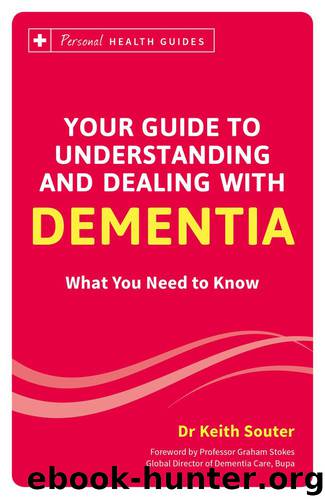Your Guide to Understanding and Dealing With Dementia by Dr Keith Souter

Author:Dr Keith Souter
Language: eng
Format: epub
Publisher: Summersdale Publisher
Published: 2015-02-24T00:00:00+00:00
These tests can help to show what sort of problems the person is having. They also act as a baseline against which changes can be seen. This can help with diagnosis.
Brain scans
In the UK it is recommended by NICE, the National Institute for Health and Care Excellence, that a scan of the brain should be performed. These will pick up on haemorrhages, clots and tumours and give an idea about the volume of the brain and whether there has been any shrinkage in any specific parts or of the whole brain. There are three types of scan that may be arranged:
• CT – This stands for Computerised Tomography. X-rays of the brain are taken from various angles and analysed by a computer to build up a 3D image of the brain.
• MRI – This stands for Magnetic Resonance Imaging. It uses magnetism, ultrasound and computerised technology to build up multiple images of the inside of the body. These may show the tissues and any abnormalities in surprising detail. It can be an alarming investigation for people who are prone to claustrophobia, since with some scanners it necessitates being advanced through a large tunnel-like apparatus. This is the preferred type of scan if it is available, as suggested by NICE.
• PET – This stands for Positive Emission Tomography. It is an investigation that involves the injection of a radioactive substance that is taken up temporarily by cells in the brain. The scanner picks up on the radioactive emissions and looks at the flow of blood through the brain. It builds up a picture of the functional aspect of the brain. This is a highly sophisticated scan, which is performed less frequently than the CT scan or the MRI scan.
KEY POINTS
An abnormal scan may help to diagnose dementia and point towards the type.
A normal scan does not exclude dementia, since in the early stages of Alzheimer’s disease the brain may show changes that are similar to ageing changes.
Download
This site does not store any files on its server. We only index and link to content provided by other sites. Please contact the content providers to delete copyright contents if any and email us, we'll remove relevant links or contents immediately.
Periodization Training for Sports by Tudor Bompa(8251)
Why We Sleep: Unlocking the Power of Sleep and Dreams by Matthew Walker(6694)
Paper Towns by Green John(5175)
The Immortal Life of Henrietta Lacks by Rebecca Skloot(4571)
The Sports Rules Book by Human Kinetics(4378)
Dynamic Alignment Through Imagery by Eric Franklin(4206)
ACSM's Complete Guide to Fitness & Health by ACSM(4049)
Kaplan MCAT Organic Chemistry Review: Created for MCAT 2015 (Kaplan Test Prep) by Kaplan(3999)
Introduction to Kinesiology by Shirl J. Hoffman(3765)
Livewired by David Eagleman(3762)
The Death of the Heart by Elizabeth Bowen(3605)
The River of Consciousness by Oliver Sacks(3598)
Alchemy and Alchemists by C. J. S. Thompson(3510)
Bad Pharma by Ben Goldacre(3420)
Descartes' Error by Antonio Damasio(3270)
The Emperor of All Maladies: A Biography of Cancer by Siddhartha Mukherjee(3142)
The Gene: An Intimate History by Siddhartha Mukherjee(3091)
The Fate of Rome: Climate, Disease, and the End of an Empire (The Princeton History of the Ancient World) by Kyle Harper(3055)
Kaplan MCAT Behavioral Sciences Review: Created for MCAT 2015 (Kaplan Test Prep) by Kaplan(2980)
